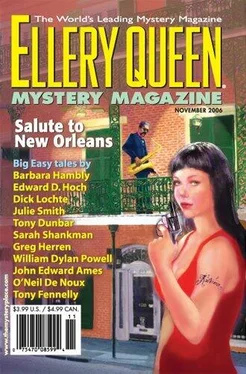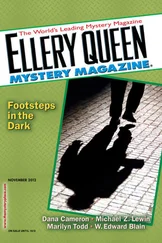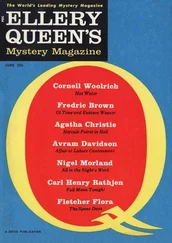John Ames - Ellery Queen's Mystery Magazine, Vol. 128, No. 5. Whole No. 783, November 2006
Здесь есть возможность читать онлайн «John Ames - Ellery Queen's Mystery Magazine, Vol. 128, No. 5. Whole No. 783, November 2006» весь текст электронной книги совершенно бесплатно (целиком полную версию без сокращений). В некоторых случаях можно слушать аудио, скачать через торрент в формате fb2 и присутствует краткое содержание. Город: New York, Год выпуска: 2006, ISBN: 2006, Издательство: Dell Magazines, Жанр: Детектив, на английском языке. Описание произведения, (предисловие) а так же отзывы посетителей доступны на портале библиотеки ЛибКат.
- Название:Ellery Queen's Mystery Magazine, Vol. 128, No. 5. Whole No. 783, November 2006
- Автор:
- Издательство:Dell Magazines
- Жанр:
- Год:2006
- Город:New York
- ISBN:ISSN 0013-6328
- Рейтинг книги:5 / 5. Голосов: 1
-
Избранное:Добавить в избранное
- Отзывы:
-
Ваша оценка:
- 100
- 1
- 2
- 3
- 4
- 5
Ellery Queen's Mystery Magazine, Vol. 128, No. 5. Whole No. 783, November 2006: краткое содержание, описание и аннотация
Предлагаем к чтению аннотацию, описание, краткое содержание или предисловие (зависит от того, что написал сам автор книги «Ellery Queen's Mystery Magazine, Vol. 128, No. 5. Whole No. 783, November 2006»). Если вы не нашли необходимую информацию о книге — напишите в комментариях, мы постараемся отыскать её.
Ellery Queen's Mystery Magazine, Vol. 128, No. 5. Whole No. 783, November 2006 — читать онлайн бесплатно полную книгу (весь текст) целиком
Ниже представлен текст книги, разбитый по страницам. Система сохранения места последней прочитанной страницы, позволяет с удобством читать онлайн бесплатно книгу «Ellery Queen's Mystery Magazine, Vol. 128, No. 5. Whole No. 783, November 2006», без необходимости каждый раз заново искать на чём Вы остановились. Поставьте закладку, и сможете в любой момент перейти на страницу, на которой закончили чтение.
Интервал:
Закладка:
He knew the odds were only fifty-fifty that he’d get a truthful answer to his next question. “Was there anyone else?”
“No!” Casmalia dabbed — very carefully — at her painted eyes with a tiny square of lawn and lace, and Clisson and Dominique again traded a glance. “Benjamin, it is vital — vital — not only that my daughter be found swiftly, but that no word of this — this terrible tragedy — be allowed to reach m’sieu Dutuille’s ears... or those of m’sieu Rochier. Poor m’sieu Dutuille would be devastated—”
“I understand.” And he did understand, seeing how his mother, Bernadette Métoyer, and Agnes Pellicot all leaned forward to catch and sift every word. Gossip was the lifeblood of the free colored demimonde. The fact that Casmalia Rochier, devastatingly elegant in her expensive simplicity, was inclined to boast virtually guaranteed that her misfortune would be trumpeted abroad.
Her own business, of course, but dispensing with an audience would greatly increase his chances of getting anything like truthful answers. “Maman, with Madame Rochier’s permission I’m going to walk her home. Please, all of you ladies, finish your coffee. I’ll return in a few minutes. Madame?” He held out his arm, onto which Casmalia Rochier laid one exquisitely kid-gloved hand.
“You don’t think it was slave-stealers, do you?” he asked, very quietly, as he led Casmalia out through the long French doors of his mother’s cottage and onto Rue Burgundy. Even this far from the river — nearly half a mile — the sound of the levee made a jumbled background to the closer noises of passing carriages, of servants and women talking in doorways and breezeways, of dogs barking in yards: the noises of New Orleans in the winter season, between cotton harvest and sugar-boiling, when the planters came into town and opened up their houses and the city came alive.
Casmalia Rochier glanced right and left, as if making sure none of her friends had tiptoed after them to listen, and let out her breath in an angry sigh. “Ben, it is absolutely imperative—”
He held up a hand. “I know. That m’sieu Dutuille doesn’t hear of it — or m’sieu Rochier. Who do you think it was?”
“Nicholas Saverne.” Her eyes, green-gray like those of so many libres, turned steely. “A lawyer from Mobile, absolutely no family, and encroaching as a weed. He swears he’ll be the wealthiest man in the parish in a year, but I know his kind!”
“Would your daughter have gone with him willingly?”
“Of course not!” But her glance again fleeted from his. “Her father went to great lengths to arrange this match with m’sieu Dutuille, who is absolutely infatuated with her. She would never do a thing like that to me.”
Not, January was interested to note, to him.
“She is a most dutiful girl — and needless to say, deeply in love with m’sieu Dutuille.”
By the defensive note in her voice it was clear to January that Marie-Zulieka had been nothing of the kind. He handed Casmalia across the plank that bridged the gutter of Rue des Ursulines; they had reached the pale-green cottage, with its fresh pink trim, that Louis Rochier had twenty years ago purchased for his plaçee. Because January was a man — and no Creole, black or white, would walk straight through the French doors of the parlor like a barbarian — he followed her down the narrow breezeway that separated her cottage from the next, and through the yard into the dining room: Any of her woman friends would have been escorted through her bedroom. This custom allowed him to note the layout of the house, which was substantially the same as his mother’s and that of every other plaçee in the French town. The four-room cottage faced the street, and the building behind housed kitchen, laundry, slave quarters, and the garçonnière: the room or rooms for the growing sons of the house.
A girl who had to be Lucie darted out of the French doors at the rear of the house as January and Casmalia approached: “Did you find her?” She raised frightened eyes up to her mother. “She didn’t really get stolen away by the American animals, did she?”
January replied reassuringly, “I don’t think so, p’tit. But if she gets stranded on foot someplace far away, she might have to sell her earrings to get home. Might I see her jewel box, so we can tell how much she’ll have with her to sell?”
After a quick glance at her mother, Lucie led the way self-importantly to the door into the bedroom she clearly shared with her sister. January had already noted the three sets of bedding that the housemaid was hanging to air on the railings of the gallery: Between Marie-Zulieka and Lucie, who looked to be eight or nine, Casmalia had evidently borne at least three sons. They would be out, he guessed, either at school or more probably at whatever shops or businesses to which they’d been apprenticed. The daughters of plaçees almost routinely became plaçees themselves, the sons almost universally artisans or clerks.
He recalled, too, from his own childhood, how he — the ungainly son who too closely resembled his mother’s slave husband — had been early relegated to the garçonnière, and how Dominique, from her birth, had been given her own pretty room in the cottage, much like this that Marie-Zulieka and Lucie shared. The walls were papered with green-and-white French wallpapers; armoire, bureau, and the bed beneath the looped-back pink cloud of the mosquito bar were French, and new. Like Dominique, obviously her mother’s lace-trimmed princess, clothed in white mull muslin with whose simple prettiness even the most exacting Frenchwoman could not have found fault.
Of a piece with her mother, he thought, glancing back at Casmalia. Aside from the tignon — the wrapped head scarf mandated by law to mark all women of color, slave and free, apart from white women — Casmalia’s simple elegance would not have been out of place in Paris or London.
Yet he’d seen her wearing diamonds, when he played music for the quadroon balls. Louis Rochier was obviously a generous patron.
And a generous father. The jewel box Lucie opened for his inspection was a miniature treasure-house of pearls, sapphire, and aquamarine, expensive and yet carefully chosen to be not one carat more than rigidly appropriate for a girl just “out.” Yet something was missing...
“These are the things m’sieu Dutuille sent to her, on the occasion of her contract being signed.” Rather impatiently, Casmalia cleared the small stack of books from the corner of the bureau, and spread out upon it a much costlier parure of rubies. “Of course completely unsuitable for her to wear as yet — perhaps ever, if you ask my opinion. She’s so fair they’re not her color at all.”
It was a subtle brag. Like the white, upon whose power they depended, most libres saw greater beauty in pale complexions and silky hair than in the reminders of a slave-born past. “I suppose she’ll have to wear them to please him,” Casmalia continued airily. “When the time comes, I’ll suggest she have them reset.”
“I think they’re pretty,” ventured Lucie, and her mother sniffed.
“Vulgar. But as you can see, Ben, she certainly did not abscond. Not and leave all this behind. I don’t see her pearls here — there was a pearl-and-aquamarine set that her grandmother gave her, God rest her soul: far too showy for morning. I can’t imagine she’d have worn it...”
“She did,” provided Lucie. “And I think it was beautiful.”
“Nonsense. It was incorrect to wear in the daytime — what on earth can she have been thinking? And no one is interested in what little girls think.”
Читать дальшеИнтервал:
Закладка:
Похожие книги на «Ellery Queen's Mystery Magazine, Vol. 128, No. 5. Whole No. 783, November 2006»
Представляем Вашему вниманию похожие книги на «Ellery Queen's Mystery Magazine, Vol. 128, No. 5. Whole No. 783, November 2006» списком для выбора. Мы отобрали схожую по названию и смыслу литературу в надежде предоставить читателям больше вариантов отыскать новые, интересные, ещё непрочитанные произведения.
Обсуждение, отзывы о книге «Ellery Queen's Mystery Magazine, Vol. 128, No. 5. Whole No. 783, November 2006» и просто собственные мнения читателей. Оставьте ваши комментарии, напишите, что Вы думаете о произведении, его смысле или главных героях. Укажите что конкретно понравилось, а что нет, и почему Вы так считаете.












